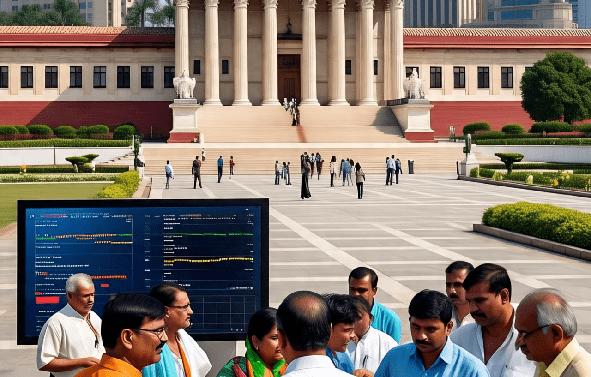May 22, 2025
By Anjali Kochhar
In a move that could reshape the future of digital finance in India, the Supreme Court has delivered a clear message to the central government: it’s time to stop sitting on the fence and start regulating cryptocurrency. During a recent hearing, the Court described Bitcoin trading as a “refined way of Hawala business” and raised concerns about the country’s lack of a legal framework to govern virtual digital assets. The Court’s strong stance has reignited calls for policy clarity, investor protection, and a structured path forward echoing what industry leaders have long demanded.
The hearing, led by Justice Surya Kant, comes at a time when crypto adoption in India is surging, yet the legal structure surrounding it remains opaque. The apex court highlighted the dangers of leaving the space unregulated, citing investor risk, lack of oversight, and potential use for illicit activities.
This judicial push marks a crucial turning point in India’s crypto narrative one that the crypto industry has been anticipating for years. Stakeholders from across the Web3 ecosystem welcomed the Court’s intervention, viewing it as a much-needed step toward legitimacy and global competitiveness.
Vikram Subburaj, CEO of Giottus Crypto Platform, released an official statement following the Court’s remarks, aligning with the judiciary’s call for regulatory clarity.
“We acknowledge the recent observations made by the Honourable Supreme Court of India, wherein trading in Bitcoin was likened to a ‘refined way of Hawala business.’ The apex court expressed concern over the absence of a clear regulatory framework for virtual digital assets,” Subburaj stated.
He continued, “At Giottus, we read these remarks as a clarion call by the apex court for the establishment of comprehensive and transparent regulations governing the crypto sector. The Supreme Court’s emphasis on the need for policy clarity underscores the urgency for legislative action to provide a structured environment for digital asset transactions.”
Subburaj also pointed out India’s global opportunity. “At the global level, India stands at a pivotal juncture. We are witnessing the rapid adoption of crypto assets into mainstream finance by leading economies like Singapore, UAE, and the US. A lot of major companies and large institutions are also adding crypto assets, especially Bitcoin, to their balance sheets.”
He emphasised that while the government has made some progress such as mandating crypto exchanges to register with the Financial Intelligence Unit (FIU) and coordinating cybercrime efforts a fully-fledged regulatory body akin to the RBI or SEBI is needed. “An all-encompassing regulatory framework and an exclusive body to regulate crypto assets is the need of the hour. Such a framework would not only safeguard investors but also position India as a leader in the global digital economy.”
Anish Jain, CEO of W Chain, a leading hybrid blockchain network, also responded positively to the Supreme Court’s direction.
“The Supreme Court’s directive urging the central government to clarify its stance on regulating crypto trading is a significant development. It reflects growing recognition that digital assets are no longer fringe instruments but integral to the evolving financial landscape,” Jain said.
He added, “W Chain welcomes this judicial inquiry as a constructive step toward establishing a clear, robust, and forward-looking regulatory framework. Regulation is not a constraint; it is a catalyst. Proper oversight will promote investor protection, financial stability, and institutional confidence, while unlocking innovation and capital formation in the Web3 economy.”
He concluded, “India has the potential to be a global leader in digital asset innovation. What is needed now is regulatory clarity, underpinned by a balanced approach that enables growth without compromising compliance.”
Mr. Siddharth Ugrankar, CEO & Co-Founder of Qila.io, emphasised the urgency of regulations in light of the Court’s stance.
“India’s Supreme Court recently asked the government to take a blanket move towards regulation of usage of cryptocurrency in India. Since the market for digital currency is expanding at a very fast pace, the requirement for open rules is being felt more and more so that the investors are protected and misuse, i.e., money laundering and fraud, is avoided,” he noted.
“The Court highlighted the creation of an architecture of law that enables innovation but ensures the financial system and consumer welfare. Cryptocurrencies, although increasingly popular, are currently in India in a grey category where there are no law-making regulations that control their exchange or use.”
He added, “The Supreme Court appeal reflects growing concern regarding the volatility of these virtual currencies and the risks involved. As the number of Indians investing in cryptocurrencies increases, experts have indicated that regulation would bring much-needed certainty to both the investors and the industry.”
While the “hawala” comparison may seem harsh, industry leaders are interpreting the Supreme Court’s move as a net positive an opportunity to push India toward thoughtful, structured, and forward-looking legislation.
About the author
Anjali Kochhar covers cryptocurrency and blockchain stories in India as well as globally. Having been in the field of media and journalism for over four years now, she has developed a sharp news sense and works hard to present information that goes beyond the obvious. She is an avid reader and loves writing on a wide range of subjects.


